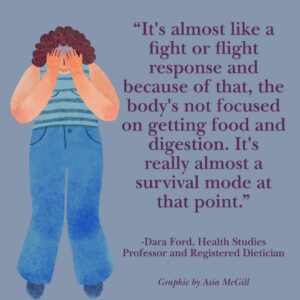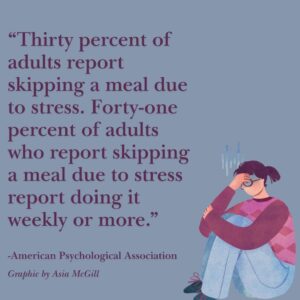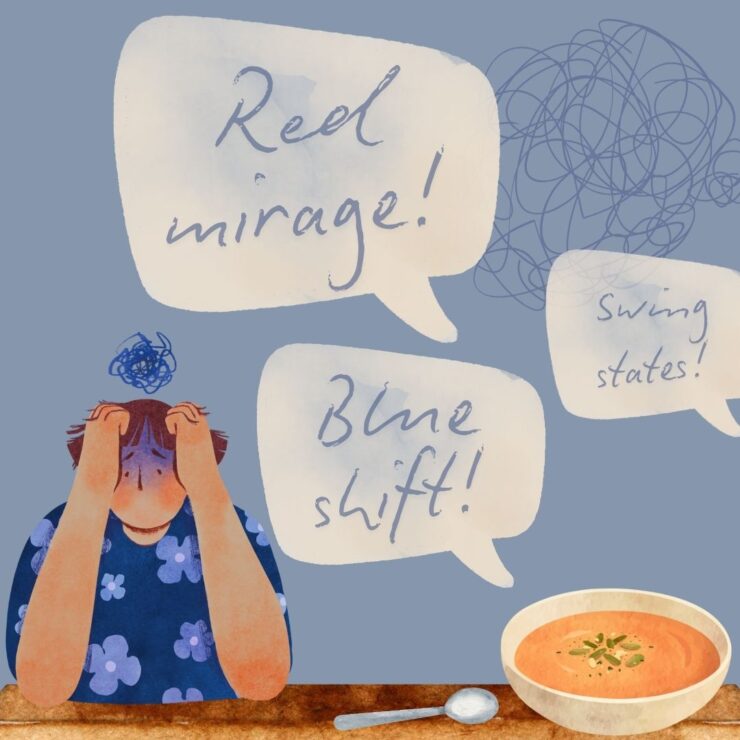Dietitians say it’s not uncommon for people to lose their appetite after a disappointment, and that appears to be happening to some supporters of Vice President Kamala Harris.
Election results that do not align with the hopes of a voter are what health studies professor and registered dietician Dara Ford describes as an example of acute stress. Though acute stress is typically short-term, it has the ability to suppress appetite hormones in the body, Ford said.
Several Harris supporters tell The Wash they are experiencing exactly that following Harris’ defeat in the presidential race.
“It’s almost like a fight or flight response and because of that, the body’s not focused on getting food and digestion. It’s really almost a survival mode at that point,” Ford said.
Ciara Taylor was a first-time voter in this election and tried to maintain an optimistic outlook but couldn’t shake the feeling that things could go drastically south.
When Taylor realized the voting numbers were in favor of Donald Trump, she didn’t eat anything and said she “felt a heavy cloud” over her.
She turned on the news to keep up with the election updates, but not too much later, she had to shut the television off. “It was starting to make my stomach hurt… [and] I tend to carry my anxiety in my stomach,” she said.
Taylor spent the night mostly awake and had to turn off her phone from fear of seeing more states turn red.
“I started to get a little bit hopeful and then I heard about something called a red mirage… but it started to look a little bit more than a red mirage, so I decided I was going to not look at the results, but I couldn’t help myself,” she said. 
Donald Trump was announced as the 47th president in the early hours of Nov. 6, and Taylor could not stomach the thought of what the next four years will look like for her.
“It was weird because I was forgetting about an appetite like there were so many things running through my head that I was just forgetting that an appetite even existed,” she said.
Taylor had to remind herself to eat in the days that followed, but even when she did, she could only tolerate bland foods.
“I would be nauseous before I ate, but also nauseous because I didn’t eat and then just be more nauseous after I ate and it just wasn’t really going too well with me,” she said.
Nina Thomas realized she lost her appetite a week before the election, and once the results were called, her prioritization to eat dwindled.
“The night of the election, I did not eat,” she said. “The day after the election, I did not eat again just out of sadness and reflections of the outcome of the election and feeling like that sense of hopelessness.”
Thomas didn’t eat her first full meal until two days after the results at 10 p.m., and as someone who typically enjoys cooking, she said it still felt like a chore.
“I feel like I’m not finding enjoyment in a lot of things post-election and anxiety just kind of takes the fun out of a lot of things,” she said.
Kelsey Espada went to bed at 11 p.m. on the night of the election and said she woke up at six in the morning because she “had the jitters.” She woke up in disbelief.
“Once I looked, I actually told myself I was like, no, this has to be a dream. Let me go back to sleep. And once I actually got up, I looked at the results again, and I noticed, okay, this is real life.”
Espada said she and her family had all felt queasy after seeing the results, and that she didn’t feel like herself.
“I actually felt sick to my stomach, and I didn’t want to eat. I really didn’t,” Espada said.
Espada said she had high hopes for the election and believed that Harris was fit for the role of being the next president. But the road to 270 had just been too steep.
Espada ate her first full meal three days after the election, and even though she was working to gain her strength back, she said “the fight continues on.”
“I think right now things might look a little blurry and I think we’re all in this state of uncertainty, but I think as long as we are continuing to build community, advocate for one another and really just coming together, especially for those who are people of color, I really think that is what will be the best bet,” Espada said.
According to the American Psychological Association, 30% of adults skip a meal due to stress.
Ford said that within the “first 12 hours” of not eating enough, people can begin noticing the shifts in their body after skipping a meal.
 “You can have headaches, fatigue, irritability.
That’s all very short term when it comes to not eating enough,” she said.
“You can have headaches, fatigue, irritability.
That’s all very short term when it comes to not eating enough,” she said.
But Ford warns against allowing the short-term effects of undereating to turn into long-term effects, as it can be more harmful to the body.
“Longer term would be concerns like nutrient deficiencies,” Ford said. “Short-term stress can become long-term, and then typically long-term stress.”
While it may be difficult to hold food down in moments of appetite loss, Ford advises those who are having a hard time to try to take care of themselves in the small ways they can.
“Try to eat your regular meals in a day. Maybe they’re smaller, maybe it’s different foods, but making sure you’re eating at regular intervals, eating foods that feel good to you at that time. Getting a vegetable and getting a fruit in is great,” Ford said.
When The Wash presented the question of appetite loss due to the election results through an Instagram story, only women came forward. While men can have a shared experience, registered dietician Elsa Chu believes the topics discussed during campaigns may have made this election “more personal” to women.
“I think a lot of men feel frustrated and angry and scared on a political level, but they aren’t afraid that some of their fundamental rights are being violated,” Chu said.
Chu specializes in sports nutrition and eating disorders at Fueling for Recovery, and said it is “pretty normal to lose an appetite” during times of emotional instability.
“That part of us that when we feel deeply unsafe, when we feel scared, when we feel panicked or anxious, a lot of people’s appetite will turn off because that’s kind of a safety sense that we need to feel,” Chu said.
Chu described the nervous system as categorized into two functions: fight or flight, rest, and digest. When someone is in fight or flight mode due to high stress levels, they have trouble accessing their rest and digest function, leading to sleep and appetite loss.
Chu said that even though “self–care becomes much more prescriptive” during times of high stress, getting back to self-care habits requires “a lot of gentleness with ourselves.”
“Even if the world is crashing around you, your body deserves and needs care and needs nutrients and needs rest,” Chu said.
For those who are having trouble gaining their appetite, Chu said, “try to find someone else or find community or find bonding. For a lot of people that helps ease anxiety not around eating, but with eating. If you want to share a meal with somebody else, that tends to help us de-block.”
If you or someone you know is having trouble with their eating habits due to stress, please refer to https://fuelingforrecovery.com/contact-us/















Add comment